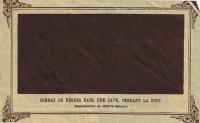Word play
From The Art and Popular Culture Encyclopedia

Illustration: House of Nonsense (1911), one of Blackpool's funhouse attractions
|
Les dents, la bouche. --"Les dents, la bouche" (1900) by Jean-Pierre Brisset |

|
Related e |
|
Featured: |
Word play or wordplay is a literary technique and a form of wit in which the words that are used become the main subject of the work, primarily for the purpose of intended effect or amusement. Examples of word play include puns, phonetic mix-ups such as spoonerisms, obscure words and meanings, clever rhetorical excursions, oddly formed sentences, double entendres, and telling character names (such as in the play The Importance of Being Earnest, Ernest being a given name that sounds exactly like the adjective earnest).
Interestingly enough, strictly visual orthographic word play is much less predominant than sound-based word play in alphabetically written literatures. This may be due to the fundamental orality of written communication in those literatures, as compared with word play in ideographically written literatures such as the Chinese.
Most writers engage in word play to some extent, but certain writers are particularly adept or committed to word play. Shakespeare's "quibbles" have made him a noted punster. P.G. Wodehouse was also hailed as a "comic genius recognized in his lifetime as a classic and an old master of farce" for his ingenious wordplay. James Joyce, author of Ulysses and Finnegans Wake, is another noted word-player. For example, Joyce's phrase "they were yung and easily freudened" clearly conveys the meaning "young and easily frightened," but it also makes puns on the names of two famous psychoanalysts, Jung and Freud.
Other writers closely identified with word play include:
- Lewis Carroll in his Alice books
- Willard R. Espy, who collected several anthologies of word play
- Vladimir Nabokov
- George Bernard Shaw. The well-known spelling of fish as ghoti is often (but perhaps incorrectly) attributed to Shaw: "gh as in tough, o as in women, ti as in station".
- Van Dyke Parks
- Thomas Pynchon
- Flann O'Brien
- Jasper Fforde
- Jack Kerouac in On the Road and more so in Visions of Cody
The Apocryphal book of Susanna has elements of word play in its original Greek.
Plays can enter common usage as neologisms.
Word play is closely related to word games, that is, games in which the point is manipulating words. See also language game for a linguist's variation. The Hungarian term for wordplay, occasionally used in the circle for its diaeres is Szójáték.
See also


